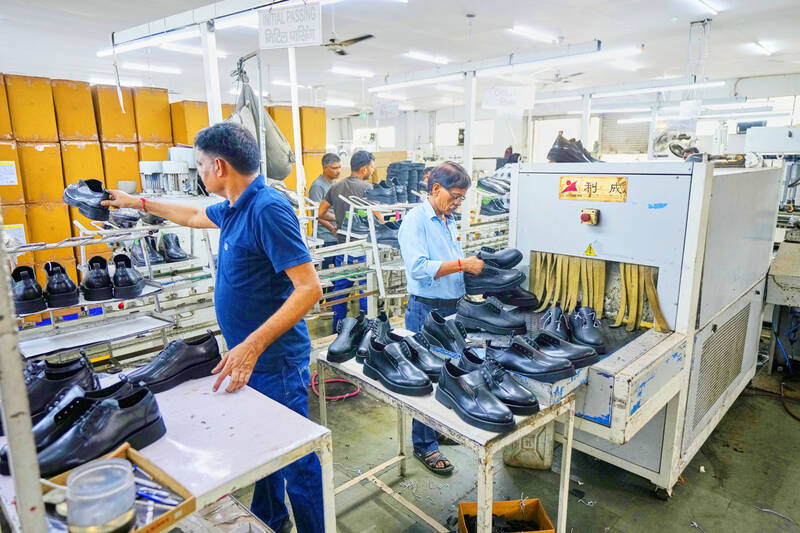Steep US tariffs on a range of Indian products took effect yesterday, threatening a steep blow to India’s overseas trade in its largest export market.
US President Donald Trump had initially announced a 25 percent tariff on Indian goods, but earlier this month he signed an executive order imposing an additional 25 percent tariff due to India’s purchases of Russian oil, bringing the combined tariffs imposed by the US on its ally to 50 percent.
The Indian government estimated the tariffs would impact US$48.2 billion worth of exports. Officials have warned the new duties could make shipments to the US commercially unviable, triggering job losses and slower economic growth.

Photo: AP
India-US trade relations have expanded over the past few years, but remain vulnerable to disputes over market access and domestic political pressures. India is one of the fastest-growing major global economies and it might face a slowdown as a result.
Estimates by New Delhi-based think tank Global Trade Research Initiative (GTRI) suggested labor-intensive sectors such as textiles, gems and jewelry, leather goods, food and vehicles would be hit hardest.
“The new tariff regime is a strategic shock that threatens to wipe out India’s long-established presence in the US, causing unemployment in export-driven hubs and weakening its role in the industrial value chain,” GTRI founder and former Indian trade official Ajay Srivastava said.
The US has for now exempted some sectors, such as pharmaceuticals and electronic goods, from additional tariffs, bringing some relief for India as its exposure in these sectors is significant.
Groups representing exporters warn that new import tariffs could hurt India’s small and medium enterprises that are heavily reliant on the US market.
“It’s a tricky situation. Some product lines will simply become unviable overnight,” Federation of Indian Export Organizations director general Ajay Sahai said.
The tariffs come as the Trump administration continues to push for greater access to India’s agriculture and dairy sectors.
India and the US have held five rounds of negotiations for a bilateral trade agreement, but have yet to reach a deal. That is largely because New Delhi has resisted opening these sectors to cheaper US imports, citing concerns that doing so would endanger the jobs of millions of Indians.
Indian Prime Minister Narendra Modi has vowed not to yield to the pressure.
“For me, the interests of farmers, small businesses and dairy are topmost. My government will ensure they aren’t impacted,” Modi said at a rally this week in his home state of Gujarat.
Modi said the world was witnessing a “politics of economic selfishness.”
A US delegation canceled plans to visit New Delhi this week for a sixth round of trade talks.
The Indian government has begun working on reforms to boost local consumption and insulate the economy.
It has moved to change the goods and services tax, or consumption tax, to lower costs for insurance, cars and appliances ahead of the major Hindu festival of Diwali in October.
The Indian Ministry of Commerce and Industry and the Ministry of Finance are discussing financial incentives that would include favorable bank loan rates for exporters.
The Indian Ministry of Commerce and Industry is also weighing steps to expand exports to other regions, particularly Latin America, Africa and Southeast Asia.

GROWING OWINGS: While Luxembourg and China swapped the top three spots, the US continued to be the largest exposure for Taiwan for the 41st consecutive quarter The US remained the largest debtor nation to Taiwan’s banking sector for the 41st consecutive quarter at the end of September, after local banks’ exposure to the US market rose more than 2 percent from three months earlier, the central bank said. Exposure to the US increased to US$198.896 billion, up US$4.026 billion, or 2.07 percent, from US$194.87 billion in the previous quarter, data released by the central bank showed on Friday. Of the increase, about US$1.4 billion came from banks’ investments in securitized products and interbank loans in the US, while another US$2.6 billion stemmed from trust assets, including mutual funds,

Micron Memory Taiwan Co (台灣美光), a subsidiary of US memorychip maker Micron Technology Inc, has been granted a NT$4.7 billion (US$149.5 million) subsidy under the Ministry of Economic Affairs A+ Corporate Innovation and R&D Enhancement program, the ministry said yesterday. The US memorychip maker’s program aims to back the development of high-performance and high-bandwidth memory chips with a total budget of NT$11.75 billion, the ministry said. Aside from the government funding, Micron is to inject the remaining investment of NT$7.06 billion as the company applied to participate the government’s Global Innovation Partnership Program to deepen technology cooperation, a ministry official told the

Taiwan Semiconductor Manufacturing Co (TSMC, 台積電), the world’s leading advanced chipmaker, officially began volume production of its 2-nanometer chips in the fourth quarter of this year, according to a recent update on the company’s Web site. The low-key announcement confirms that TSMC, the go-to chipmaker for artificial intelligence (AI) hardware providers Nvidia Corp and iPhone maker Apple Inc, met its original roadmap for the next-generation technology. Production is currently centered at Fab 22 in Kaohsiung, utilizing the company’s first-generation nanosheet transistor technology. The new architecture achieves “full-node strides in performance and power consumption,” TSMC said. The company described the 2nm process as

Even as the US is embarked on a bitter rivalry with China over the deployment of artificial intelligence (AI), Chinese technology is quietly making inroads into the US market. Despite considerable geopolitical tensions, Chinese open-source AI models are winning over a growing number of programmers and companies in the US. These are different from the closed generative AI models that have become household names — ChatGPT-maker OpenAI or Google’s Gemini — whose inner workings are fiercely protected. In contrast, “open” models offered by many Chinese rivals, from Alibaba (阿里巴巴) to DeepSeek (深度求索), allow programmers to customize parts of the software to suit their